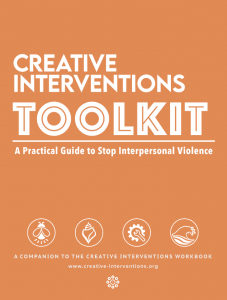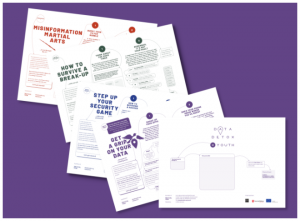Resources Library:
Start a Search:
Creating Trauma-Informed Services Tipsheet Series
These tipsheets provide practical advice on creating trauma-informed services at domestic violence programs and working with survivors who are experiencing trauma symptoms and/or mental health conditions.
Recommended for domestic violence advocates:
A Trauma-Informed Approach to Domestic Violence Advocacy
Tips for Creating a Welcoming Environment
Tips for Enhancing Emotional Safety
Tips for Supporting Children and Youth Exposed to Domestic Violence: What You Might See and What You Can Do
Practical Tips for Increasing Access to Services
Tips for Discussing a Mental Health Referral with DV Survivors
Tips for Supporting Survivors with Reduced Energy
Tips for Making Connections with Survivors Experiencing Psychiatric Disabilities
A Trauma-Informed Approach to Employment Support: Tools for Practice
Creative Interventions: A Practical Guide to Stop Interpersonal Violence

Creative Interventions was founded to shift education and resources back to families and communities. Established in 2004, the project aimed to place knowledge and power among those most impacted by violence. Creative Interventions sought to make support and safety more accessible, stop violence at early stages of abuse, and create possibilities for once abusive individuals and communities to evolve towards healthy change and transformation.
In their words:
"This Toolkit the result of a 3-year period from 2006 to 2009 during which CI joined with partner organizations in the San Francisco Bay Area including Asian Women's Shelter, Shimtuh, Narika, and La Clinica de la Raza. We also had partnerships with other individuals and organizations such as those listed in Section 0.2: A Community Effort. Our organizations worked closely together to create a different, alternative approach to issues of domestic violence and sexual assault. All of our organizations have years of experience working in mostly immigrant communities on the issues of domestic violence and sexual assault. And all were interested in coming together to try to create different options for people experiencing violence. The 3-year project that we called the Community-Based Interventions Project brought our team together to create a new vision for violence intervention, to work with people experiencing violence, and to develop a model and tools from our work during that time."
Check out these toolkits developed by people who want to end the cycle of violence in our communities and our world. The 500+ page toolkits are available for download in English and Spanish but clicking the links below. Additional resources are available by visiting the Toolkits section of their website.
Cultivating SART Efficacy: Insights on the Impact of the Virginia Sexual Assault Response Team Mandate Report
The Virginia Department of Criminal Justice Services (DCJS) is pleased to release the report, Cultivating SART Efficacy: Insights on the Impact of the Virginia Sexual Assault Response Team Mandate. A collaborative effort between DCJS and the Sexual Violence Justice Institute at the Minnesota Coalition Against Sexual Assault (SVJI), the project explored the implications of the 2009 Code of Virginia legislation (§ 15.2-1627.4) that mandated the establishment of a multidisciplinary response to criminal sexual assault in each locality.
As you’ll see in the report, numerous considerations are presented to further enhance Sexual Assault Response Team (SART) efforts in Virginia. In the coming months, DCJS will begin exploring these considerations through a variety of collaborative efforts, to include training, resource development, SART protocol revisions, and more. We look forward to helping SARTs throughout Virginia become more efficient, more effective, and better able to serve victims of sexual assault.
A summary of results from the full national project is also available here.
Culture, Language, and Access: Key Considerations for Serving Deaf Survivors of Domestic and Sexual Violence
This policy and practice brief summarizes the findings from work with the Deaf community and offers practical suggestions for increasing Deaf survivors’ access to victim services and other supports, including those offered by the criminal justice and medical systems. This information providse a framework for meeting the needs of Deaf survivors that is grounded in the cultural and linguistic needs of this community. It will also ground policymakers, practitioners, and first responders in the victim services field in the realities of this often-overlooked community.
Data Detox x Youth

Data Detox x Youth is an activity book to help young people take control of their tech. This interactive toolkit encourages young people to think about different aspects of their digital lives, from their social media profiles to their passwords, with simple activities for reflection and play.
The activity book contains four sections:
- Digital Privacy, which focuses on reducing data traces and understanding online profiling;
- Digital Security, with tips on creating strong and secure passwords;
- Digital Wellbeing, which deals with the addictive nature of smartphones;
- and finally Misinformation, a guide for consuming and sharing information online.
The toolkit is designed for 11 to 16-year-olds who already have their own devices, but it can be used by people of all ages. All you need is a smartphone or a tablet, a printer and something to write with.
Places where the Data Detox x Youth could be used:
- In a classroom (or virtual classroom)
- At home
- By youth groups and organisations (e.g. in a workshop)
Also available in العربية (Arabic), Basque, Brazilian Português, Čeština (Czech), Deutsch, Español, Ελληνικά (Greek), Italiano, Nederlands, Norsk, Português and Shan.

